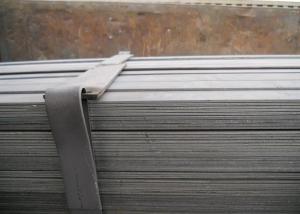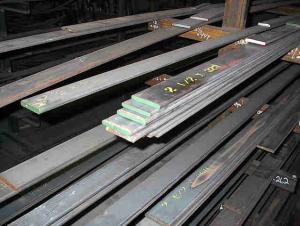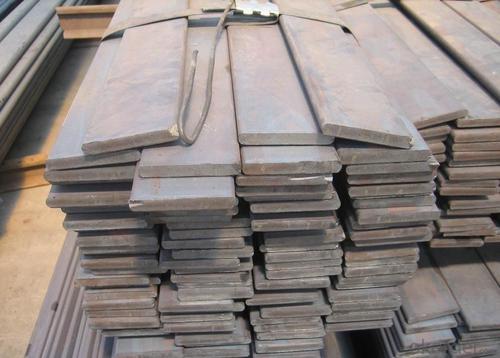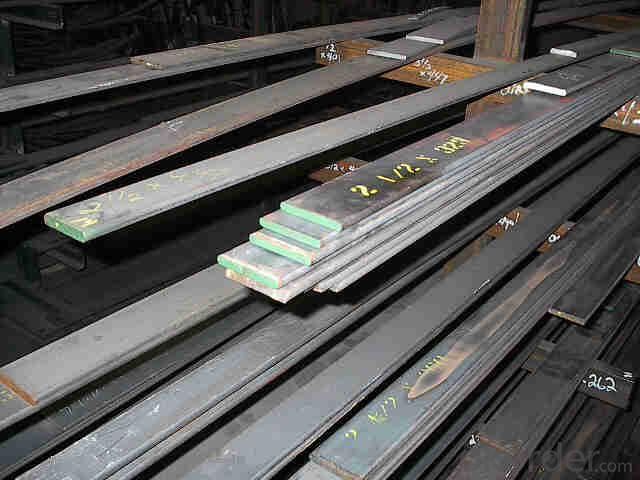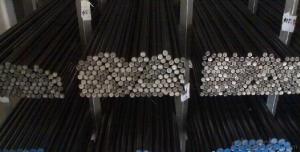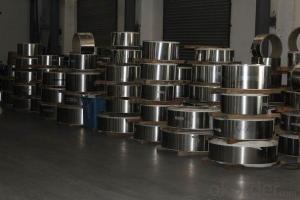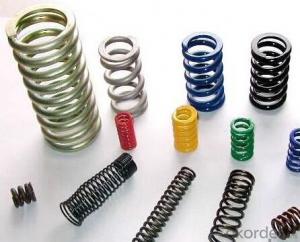Spring Steel
- Loading Port:
- China Main Port
- Payment Terms:
- TT or LC
- Min Order Qty:
- 100Tons m.t.
- Supply Capability:
- 500Tons Per Day m.t./month
OKorder Service Pledge
OKorder Financial Service
You Might Also Like
Spring Steel can be divided into two types. One is carbon spring steel, and other one is alloy spring steel.
Alloy spring steel is based on carbon spring steel, by adding one or more alloying elements to improve the mechanical properties, hardenability and other properties to meet the requirement for manufacturing all kinds of spring steel.
Specification of Spring Steel:
-Material: 70Si2CrA
-Production: Hot rolled or cold rolled
-Standard: GB/T·5218-1999
-Type: Spring Steel
-Alloy or no: Alloy
Chemical Composition:
C | Mn | Si | Cr |
0.65~0.75 | 0.40~0.60 | 1.40~1.70 | 0.20~0.40 |
S | P | Ni | |
≤0.030 | ≤0.030 | ≤0.030 |
Mechanical Properties:
-Annealing Condition:
1, Tensile Strength: σb/MPa:≤835
2, Elongation: δ/%:≥8
-Quencher condition:
1, Tensile strength: σb/MPa:785~1175
2, Elongation: -
Usage/Applications of Spring Steel:
For manufacturing all kinds of flat spring or round spring with small sections, clockwork spring,
Packaging & Delivery of Spring Steel:
-Packing Detail: The products can be packed in bundles by steel wires.
-Marks:
1, Tag marks: the tag marks will be tied up to each bundle of the products. The information is usually including supplier’s logo and name, product name, made in China, products’ specifications, the painted color and other information requested by customers.
2, Color marks: we will paint both ends of the bundles of these products to make sure that they are more evident. It’s will be more convenient for the customers to distinguish them at the destination port.
-Delivery Detail:
1, Delivery time: 30~45 working days after receive buyer’s T.T. or L/C.
2, Delivery status should be written in the contract. (Heat treatment or no)
Payment:
-Invoicing on theoretical weight or actual weight as customer’s request.
-FOB, CFR or CIF.
-Regular terms of payment:
1, 30% payment in advance, the remaining balance (70% payment) against the copy of B/L. 100% payment before shipment.
2, 30% payment in advance, the remaining balance (70% L/C) against the copy of B/L. 100% payment before shipment.
3, Negotiable.
Photos of Spring Steel:
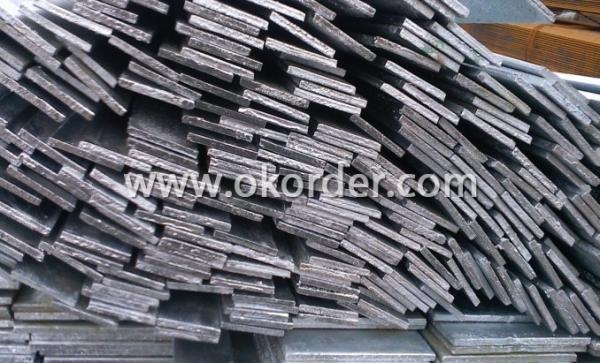
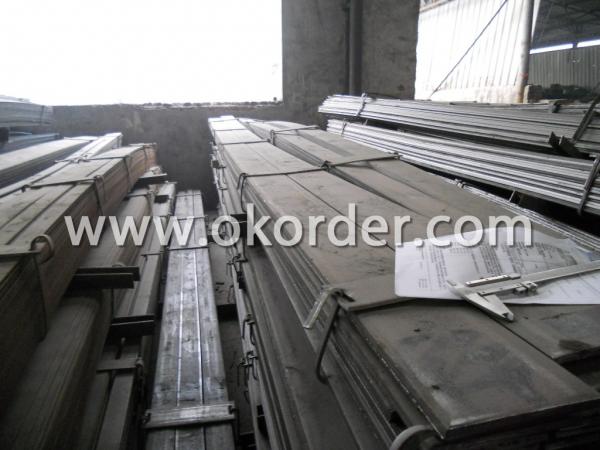
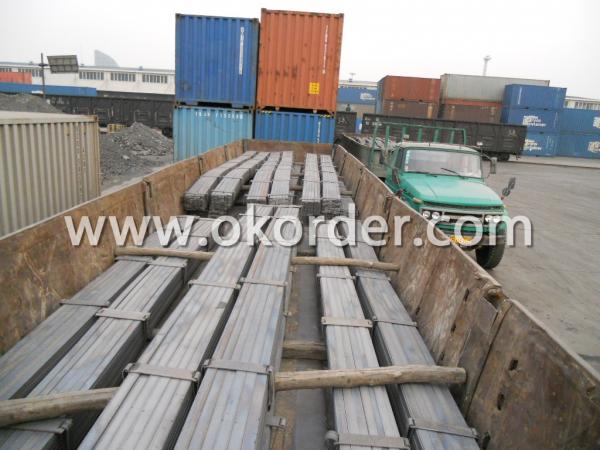
- Q: What are the different oil and gas grades of special steel?
- There are several different oil and gas grades of special steel, including but not limited to API 5CT, API 5L, and ASTM A106. These grades are specifically designed to meet the requirements and demands of the oil and gas industry, ensuring high strength, corrosion resistance, and durability in harsh environments.
- Q: How does special steel perform in oil and gas applications?
- Due to its outstanding performance and superior properties, special steel is highly sought after and extensively used in oil and gas applications. The exceptional resistance to corrosion exhibited by special steel is crucial in environments where oil and gas are present, as it helps prevent equipment failure and guarantees the longevity and reliability of the components. In addition, special steel possesses remarkable strength and durability, making it capable of withstanding extreme conditions such as high pressure and temperature. This strength enables the steel to endure the demanding and harsh environments often encountered in oil and gas applications. Moreover, special steel retains its mechanical properties even at elevated temperatures, ensuring stability and reliability in these challenging conditions. Another notable advantage of special steel is its excellent weldability. This property allows for easy fabrication and assembly of components, reducing production time and costs. It also ensures the integrity of the structures and equipment used in oil and gas applications. Furthermore, special steel offers exceptional resistance to fatigue and wear, which are commonly encountered issues in oil and gas operations. The ability of special steel to withstand cyclic loading and abrasive conditions guarantees the longevity and reliability of the components, thereby reducing maintenance and replacement costs. Overall, special steel performs exceptionally well in oil and gas applications due to its corrosion resistance, high strength, durability, weldability, and resistance to fatigue and wear. These superior properties make it the preferred choice for critical components, ensuring the efficiency, safety, and reliability of oil and gas operations.
- Q: How does special steel perform in abrasive environments?
- Special steel performs exceptionally well in abrasive environments. Its high hardness and resistance to wear make it ideal for applications where there is constant contact with abrasive materials. Special steel can withstand the impact and friction caused by abrasive particles, ensuring longevity and durability in such environments. Additionally, its corrosion resistance properties prevent the steel from deteriorating due to exposure to moisture or chemicals commonly found in abrasive environments. Overall, special steel is specifically designed to excel in abrasive conditions, providing optimal performance and reliability.
- Q: What are the properties of high-strength tool steel?
- High-strength tool steel possesses excellent hardness, wear resistance, and toughness. It has the ability to retain its sharpness, withstand high temperatures, and resist deformation. This type of steel is also known for its high strength-to-weight ratio, making it ideal for heavy-duty applications in industries such as manufacturing and construction.
- Q: How does special steel contribute to the manufacturing of bearings?
- Special steel plays a crucial role in the manufacturing of bearings due to its unique properties and characteristics. Bearings are mechanical components that facilitate smooth rotation or movement between two surfaces. Special steel, also known as bearing steel, is specifically designed to meet the demanding requirements of bearing applications. Firstly, special steel offers exceptional hardness, which is crucial for bearings to withstand heavy loads and high-speed rotations. The hardness of the steel allows the bearing to resist wear and deformation, ensuring a longer lifespan and reliable performance. Secondly, special steel possesses excellent corrosion resistance. Bearings often operate in harsh environments where they are exposed to moisture, chemicals, and other corrosive substances. The special steel used in bearing manufacturing effectively prevents rust and deterioration, ensuring the bearings can withstand these challenging conditions. Furthermore, special steel has superior heat resistance and thermal stability. Bearings can generate significant heat during operation due to friction and pressure. The special steel used in their production can withstand high temperatures without losing its structural integrity, preventing premature failure and ensuring consistent performance. Additionally, special steel offers exceptional strength and toughness. These properties are vital for bearings to withstand the intense forces and impacts they experience during operation. The high strength and toughness of the steel prevent fractures, breakages, and other forms of damage, contributing to the overall durability and reliability of the bearings. Lastly, special steel has excellent dimensional stability and machinability. This allows for precise manufacturing and shaping of the bearing components, ensuring accurate dimensions and smooth surfaces. The dimensional stability of the steel ensures that the bearings can maintain their proper fit and alignment within the machinery, minimizing any potential issues or malfunctions. In conclusion, special steel is essential in the manufacturing of bearings due to its hardness, corrosion resistance, heat resistance, strength, toughness, dimensional stability, and machinability. These properties enable bearings to withstand heavy loads, high speeds, harsh environments, and intense forces, ensuring reliable and efficient operation in a wide range of applications.
- Q: What are the different manufacturing processes used for special steel?
- There are several manufacturing processes used for special steel, including casting, forging, rolling, and heat treatment. Casting involves melting and pouring steel into molds to create complex shapes. Forging involves shaping steel by applying pressure and heat to deform it into desired forms. Rolling is a process where steel is passed through a series of rollers to reduce its thickness and shape it into sheets or bars. Lastly, heat treatment is used to alter the properties of steel by subjecting it to controlled heating and cooling processes.
- Q: How does special steel perform in cryogenic applications?
- Special steel is renowned for its exceptional performance in cryogenic applications, characterized by extremely low temperatures that fall below -150 degrees Celsius (-238 degrees Fahrenheit). Unlike regular steel, which tends to become brittle and weaker in such conditions, special steel, also referred to as cryogenic steel or low-temperature steel, is specifically engineered to withstand these extreme cold temperatures. One of the key advantages of special steel lies in its ability to maintain its mechanical properties even at cryogenic temperatures. It retains its strength, toughness, and ductility, enabling it to endure the stresses and strains imposed on it in cryogenic environments. As a result, special steel finds application in various fields, including aerospace, energy, and healthcare, where it is used in cryogenic storage tanks, pipelines, and equipment. Another significant feature of special steel is its excellent resistance to brittle fracture at low temperatures. This is of utmost importance since brittle fractures occur when materials become excessively brittle and fail under stress. The distinct composition and processing methods employed in special steel help prevent such fractures, ensuring the integrity and safety of components within cryogenic systems. Furthermore, special steel possesses a low coefficient of thermal expansion, meaning it undergoes minimal dimensional changes when exposed to temperature fluctuations. This characteristic proves highly advantageous in cryogenic applications as it preserves the stability and reliability of equipment and structures. Additionally, special steel exhibits commendable corrosion resistance, which is vital in cryogenic environments where the presence of moisture and certain chemicals can accelerate corrosion processes. By resisting corrosion, special steel enhances the longevity and durability of components, thereby reducing maintenance and replacement costs. In conclusion, special steel is the preferred choice for cryogenic applications due to its ability to maintain mechanical properties, resist brittle fracture, display low thermal expansion, and exhibit corrosion resistance. These properties render it a dependable and efficient material for use in cryogenic systems, providing the necessary strength and durability even under extremely low-temperature conditions.
- Q: How does special steel perform in high-temperature corrosion resistance?
- Special steel typically performs well in high-temperature corrosion resistance due to its unique composition and properties. It is specifically designed to withstand the harsh conditions of high temperatures and corrosive environments. The alloying elements in special steel, such as chromium, nickel, and molybdenum, enhance its resistance to corrosion and oxidation at elevated temperatures. Additionally, the steel's microstructure and heat treatment play a crucial role in improving its high-temperature corrosion resistance. Overall, special steel exhibits excellent performance in protecting against corrosion and maintaining its structural integrity in high-temperature environments.
- Q: What are the different methods of improving the impact toughness of special steel?
- There are several methods for improving the impact toughness of special steel. One common method is through heat treatment processes such as quenching and tempering, which involve heating the steel to a high temperature and then rapidly cooling it. This helps to refine the grain structure of the steel, making it more resistant to cracking and improving its toughness. Another method is alloying, where specific elements are added to the steel to enhance its toughness, such as nickel, chromium, or manganese. Additionally, controlling the cooling rate during the manufacturing process, known as controlled cooling, can also improve the impact toughness of special steel by minimizing the formation of brittle phases. Overall, a combination of heat treatment, alloying, and controlled cooling can be employed to enhance the impact toughness of special steel.
- Q: Can special steel be used in the manufacturing of consumer goods?
- Indeed, the utilization of special steel in the production of consumer goods is possible. Special steel refers to a specific type of steel that has been engineered to possess exceptional properties, such as increased strength, corrosion resistance, heat resistance, or wear resistance. These enhanced characteristics render it suitable for a broad range of applications, including the manufacturing of consumer goods. Consumer goods encompass a diverse array of products, ranging from kitchen appliances and electronics to automobiles, tools, and furniture. Special steel can be employed in various components and parts of these goods to enhance their performance and durability. For instance, in kitchen appliances, special steel can be utilized to fabricate blades, heating elements, or cooking surfaces, thereby improving cutting efficiency, heat distribution, and resistance to corrosion. In electronics, special steel can be employed in the production of casings, connectors, or springs to ensure durability, conductivity, and resistance to temperature fluctuations. Furthermore, special steel can also find application in the manufacturing of consumer goods that demand high precision and reliability. In the automotive industry, for example, special steel can be used for engine components, chassis, or safety features, providing superior strength, impact resistance, and structural integrity. Likewise, in the production of tools and equipment, special steel can be employed to manufacture drill bits, cutting tools, or machine components, guaranteeing longevity, precision, and optimal performance. In conclusion, special steel offers distinct advantages over conventional steel due to its unique properties, making it an ideal material choice for the production of consumer goods. Its enhanced strength, corrosion resistance, heat resistance, or wear resistance characteristics can significantly enhance the performance, durability, and reliability of consumer products, thereby meeting the demands and expectations of consumers.
1. Manufacturer Overview
| Location | Jiangsu, China |
| Year Established | 2003 |
| Annual Output Value | Above US$ 30 Million |
| Main Markets | Asia-Pacific; Middle east |
| Company Certifications |
2. Manufacturer Certificates
| a) Certification Name | |
| Range | |
| Reference | |
| Validity Period |
3. Manufacturer Capability
| a) Trade Capacity | |
| Nearest Port | Shanghai. |
| Export Percentage | 20% - 30% |
| No.of Employees in Trade Department | 10-20 People |
| Language Spoken: | English; Chinese |
| b) Factory Information | |
| Factory Size: | Above 100,000 square meters |
| No. of Production Lines | 2 |
| Contract Manufacturing | OEM Service Offered; |
| Product Price Range | Average |
Send your message to us
Spring Steel
- Loading Port:
- China Main Port
- Payment Terms:
- TT or LC
- Min Order Qty:
- 100Tons m.t.
- Supply Capability:
- 500Tons Per Day m.t./month
OKorder Service Pledge
OKorder Financial Service
Similar products
Hot products
Hot Searches
Related keywords

